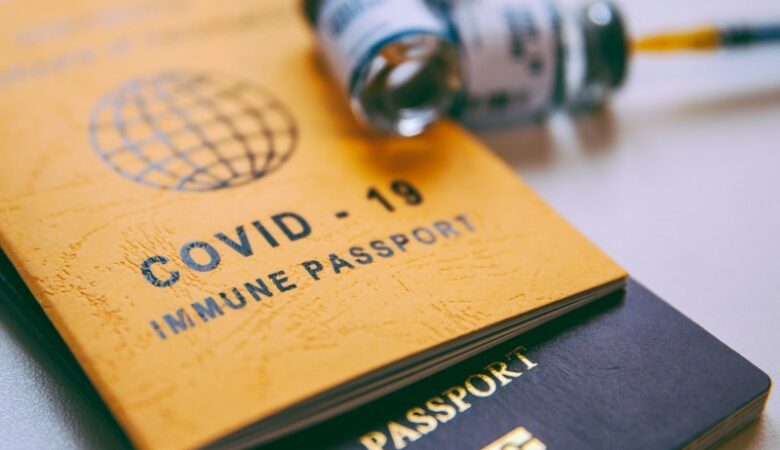
With the increase of vaccines and immunization and the persistent itch for travel, there is a global push for a system to identify vaccinated and non-vaccinated individuals. How then can governments and countries monitor the health and safety of all incoming and outgoing passengers? Enter: the vaccine passport.
What are COVID-19 Vaccine Passports?
As the name suggests, a COVID-19 vaccine passport, or a “digital health certificate” is a documentation issued by a country’s national government that is considered as proof of a person’s COVID-19 vaccination. With this vaccine passport, travellers would be permitted to travel domestically, or internationally and are generally subject to less COVID-19 restrictions, such as quarantine or presentation of a negative COVID-19 test result.
The vaccine passport is also explored for domestic use to identify those who have been vaccinated and to deny access to certain public spaces or activities to those who have not.
Current Developments
The concept of the COVID-19 vaccine passport is still in the beginning phases and under discussion. Though requiring vaccines for international travel is not a novel concept (ex. many countries require yellow fever, measles, or tuberculosis immunization before travel), the concept of requiring such a documentation for domestic travel or access to certain public spaces and venues is certainly new.
In any circumstance, for such a digital certificate or passport to work will require at least three things:
- Access to a country’s official vaccinations records;
- A secure method of identifying an individual and linking them to their health record; and
- Adherence to a common and set standard by relevant international organizations.
Additionally, public opinion on this issue has also been mixed and politicized. Many worry the passports bring about greater divisiveness and discrimination. Individuals are also not confident that their sensitive health data will be stored securely and not put to other uses by app developers and governments.
As plans for the vaccine passport expands out to access to domestic services and public spaces, many human rights groups and privacy organizations have warned of further marginalization to the most vulnerable members of society. A growing concern is how this digital infrastructure may be developed or repurposed later as there have been no talks of sunset clauses or time constraints to also place on these digital identification systems post-pandemic. A recent survey conducted in the UK also indicate public concerns on how minorities would be discriminated through vaccine passports as it separate society into the ‘haves’ and ‘have-nots’.
Yet, though there are legitimate concerns regarding such a vaccine passport, many countries have nonetheless advanced with the implementation of such a digital system.
COVID-19 Vaccine Passports Around the World
Countries Which Already Implemented COVID-19 Vaccine Passports
- China: launched a Health Declaration QR-code for its citizens on WeChat in order to travel domestically, for foreigners to travel internationally into China, and for monitoring and entering public spaces;
- Cyprus: Britons who have had two jabs can visit from 1 May, without needing a negative test or to quarantine.
- Denmark: Launched a smartphone app, named “Coronapas” which identifies whether you have had a negative test result within the last 72 hours, a certificate of vaccination, or proof of a previous infection.
- France: Trialling a vaccine passport for air travel for people travelling to the French Caribbean territories, where they’ll be able to provide a COVID-19 vaccination certificate or negative test result.
- Greece: signed a “Green Pass” agreement with Israel and currently working on bilateral agreements with 10 other countries: the UK, USA, Canada, Australia, Serbia, Russia, Ukraine, China, UAE, and Saudi Arabia.
- Israel: Launched a “Green Pass”, a smartphone app that proves you are vaccinated.
Countries Discussing or Soon-to-be Implement COVID-19 Vaccines Passports
- Australia: in discussion with other governments to recognize their COVID-19 vaccine certificates overseas.
- Canada: Trudeau says that vaccine passports were “naturally to be expected” but provided limited details
- EU-wide (projected Summer 2021): A nationally-issued “Green Digital Certificate” QR-code accepted in all EU member states that would allow anyone vaccinated against COVID-19, or those tested negative, or those recently recovered, to travel freely within the region, including those in the EEA and Switzerland. The European Commission already put forward a legislative proposal on a ‘digital green certificate’ that aims to facilitate free movement within the EU in March 2021.
- New Zealand: Airline will also trial a digital vaccine passport this month on flights between Auckland and Sydney, with Australian airline Qantas, exploring comparable technology.
- Thailand: will allow vaccinated passengers to Phuket from July 1 without self-isolation.
- UK: Working with colleagues in Scotland, Wales and Northern Ireland and said that certification for international travel an “inevitability”.
- Vietnam: Ministry of Health piloting a vaccine passport at tourist sites and golf courses
Present and Future Impacts
With the rise of COVID-19 vaccines becoming more available and accessible, international travel is due to reopen.
Though there remains many opinions and human rights concerns regarding a vaccine passport, the current projected trend is more countries requiring passengers to have a COVID-19 vaccine passport for travel, both international and domestic.
As such, for individuals seeking immigration or simply travel abroad, vaccinations may be a mandated pre-requisite in the near future.




